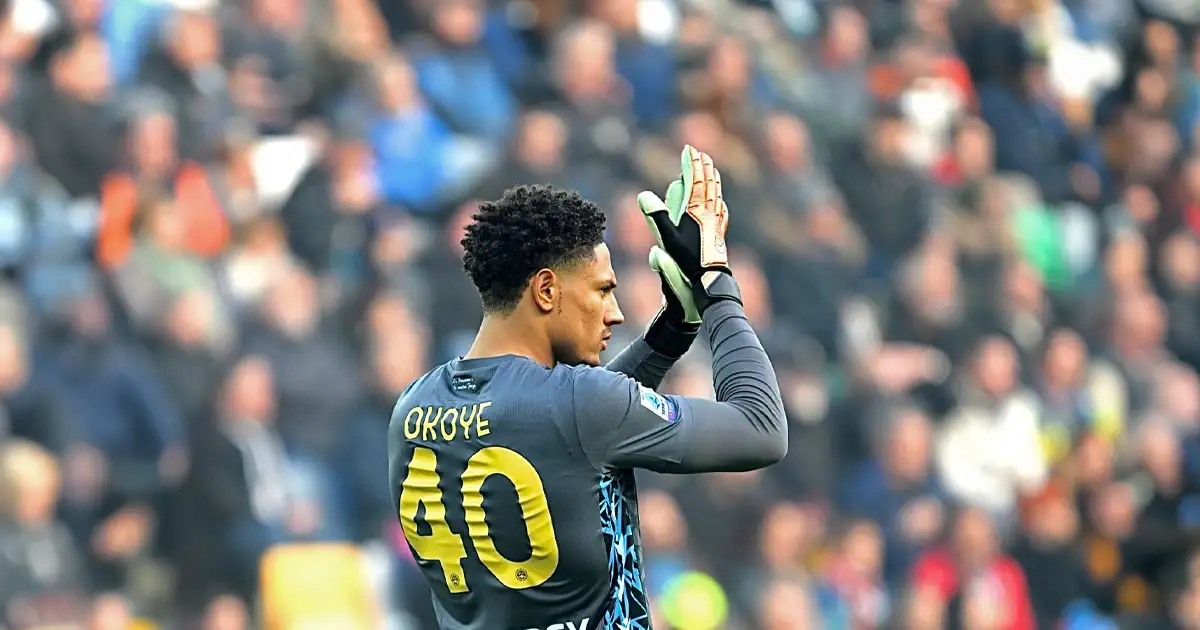Match-Fixing: Maduka Okoye at the Heart of a Serie A Scandal
Italian football is once again embroiled in a major controversy. Maduka Okoye, Udinese’s Nigerian goalkeeper, is currently the subject of an in-depth investigation for his alleged involvement in a match-fixing case. The Udinese prosecutor’s office and the Italian Football Federation (FIGC) are investigating allegations related to illegal betting around a yellow card received by the player during a Serie A match.
The trigger for the case
It all started during the match between Udinese and Lazio on March 11, 2024, a 2-1 victory for the Friulian club. During that match, Okoye was booked in the 64th minute for time-wasting. This yellow card would probably not have attracted attention if the betting operator Sisal had not detected an unusual pattern of betting speculating on this very event.
According to reports, a significant increase in stakes was observed shortly before the match, raising suspicions of manipulation.
“The correlation between these bets and the incident at the match has raised justified concerns,” said an official close to the case.
Key players in the case
In addition to Maduka Okoye, Diego Giordano, a 40-year-old restaurateur in Udine, is also implicated in the investigation. Owner of a pizzeria frequented by Udinese players, Giordano is said to have played a central role in organizing this system. Discussions regarding the bets allegedly took place at his establishment, before a verbal agreement was reached and implemented at a Sisal betting outlet.
Risks and consequences for Okoye
If the accusations are proven, Maduka Okoye risks a four-year ban from all football activities, a major blow for the 24-year-old goalkeeper.
Currently out with a wrist injury, the player and his legal team strongly deny the accusations.
“These allegations are unfounded and lack concrete evidence,” his lawyer said in an official statement.
They remain confident in Okoye’s ability to prove his innocence.
The stakes for Italian Football
In recent years, similar cases have shaken Italian football. Players Nicolo Fagioli, Sandro Tonali and Nicolo Zaniolo have been involved in betting scandals, leading to sanctions and a loss of credibility for Italian football. In the documentary “Fragile”, Fagioli opens up about his battle with gambling and sports betting addiction, highlighting the devastating impact these practices have on players’ lives and careers.
The revelations have increased pressure on football authorities to take concrete and lasting measures. According to a sports integrity expert, stricter measures must be put in place to prevent such practices, which tarnish the reputation of professional football.
What is match-fixing?
Match-fixing, also known as match-fixing, is any deliberate attempt to manipulate the outcome or outcome of a sporting event for financial or other gain. It often involves illegal betting, where individuals place bets on pre-arranged events through clandestine agreements with players, coaches or other parties involved.
Match-fixing is a serious breach of sporting integrity, damaging fan confidence and jeopardising the fairness of competitions. It is severely punished by sporting and judicial authorities, with sanctions ranging from heavy fines to bans from all sporting activities.
At European level, initiatives have been put in place to combat this scourge. UEFA, in collaboration with organisations such as Europol, actively monitors unusual betting patterns using advanced detection systems.
The Macolin Convention, adopted by the Council of Europe, also aims to combat the manipulation of sports competitions by encouraging cooperation between Member States, betting operators and sports authorities. In addition, awareness-raising campaigns and training on sports ethics are regularly organised to educate players and prevent their involvement in such practices.


